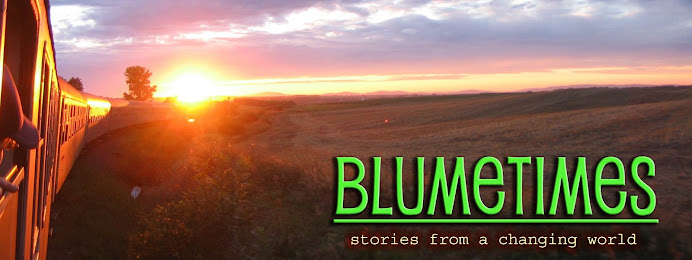
It's on Transition Towns as a positive, proactive model for addressing climate change and peak oil.
Hopefully, it'll be the first of many. In case you're a reader, as opposed to a listener, here's the text. Enjoy.
Star Sighting
I had a heady star-sighting last month. Actually it was more like an audience. After all, he knew we were coming to meet him – me and a couple of friends.
But, like bringing a white scarf when you go to meet the Dalai Lama, we did show up with a ritual offering of homage and respect. In our case it was carrot cake and elderberry fizz.
This recipient of our culinary kata was a tall, skinny, big-eared fellow…whom you’ve probably never heard of. Which means it wasn’t Barack Obama.
No, his name is Rob Hopkins and he lives in the southwest corner of England in an adorable little town called Totnes.
Totnes is the hub of something called the Transition Town movement, and Rob Hopkins is the soul behind the vision.
A few years ago, Rob took a hard look at the reality of climate change, and then coupled it with the fact that, plus or minus a couple years, we are at the moment of peak oil.
Peak oil – which the US Department of Defense says we’ll hit in 2012 – is the point when we’ve maximized worldwide oil production. All the cheap, easy-to-find stuff has been found, so demand starts to outstrip production, and the cost of oil starts to rise permanently.
Given that we use oil for everything - energy, transportation, manufacturing, agriculture, medicine – a reduction in supply, as global demand increases, will have a profound effect not just on our economy, but on almost every facet of the way we live our lives.
So, in the spirit of Fatih Birol, chief economist of the International Energy Agency, who said “We should leave oil before oil leaves us,” Rob Hopkins and a group of compatriots decided to help Totnes begin the process of what they call “powering down.” Powering down means relocalizing food and energy production, working to transform fossil-fueled behaviors, and increasing the community’s capacity to deal with any systemic shocks caused by climate change or disruptions in fuel availability.
And thus, the Transition Town movement was born.
It’s a fantastic methodology they’ve developed, and has a lot to do with tapping into the inherent wisdom of a community, and the belief that ordinary people have tremendous creative problem-solving capacity – as long as they know what the problem is.
Rob and his team also have a profound belief in developing a positive vision towards which people can work, rather than just giving them a big, scary nightmare from which to run. In fact, of the seven Principles of Transition, the first one is Positive Visioning, which focuses on the possibilities and opportunities inherent in what is a admittedly a deeply challenging global situation.
In only a few years, Transition initiatives have spread all over the world. Here in Vermont, we’ve already got about 18 different groups across the state. They’re a dynamic network of concerned-yet-hopeful people striving for a resilient, engaging, and sustainable future. And they not only welcome everyone’s participation, they consider it vital. Essential. Because, simply put, we are all in this together.



